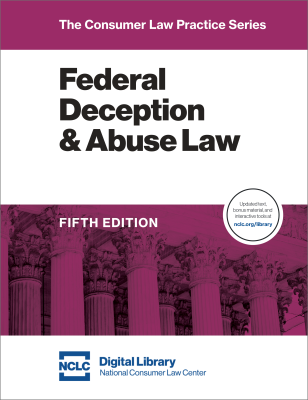The Telephone Consumer Protection Act (TCPA)—the key federal protection against robocalls, robotexts, and junk faxes—remains one of the hottest areas of consumer litigation today, with significant new decisions literally issued every day. TCPA litigation involves class and individual claims against debt collectors, telemarketers, banks, and many other businesses. Each unwanted call or text can result in $500 statutory damages ($1500 if the violation was willful or knowing).
NCLC’s Federal Deception Law Ch. 6 (3d ed. 2017) is a detailed chapter covering all TCPA issues and significant rulings. Once again, it has just been updated online at the NCLC Digital Library to include the very latest TCPA decisions.
Key Decisions on “Autodialer” Definition: The Most Important TCPA Issue Today
The TCPA prohibits autodialed calls and texts to cell phones without the called party’s consent—this prohibition is by far the most active area of TCPA litigation today. Without a definition of the term “autodialer” (more formally, “automatic telephone dialing system” or “ATDS”) that is broad enough to cover the dialing systems used today, consumers will be flooded with unwanted calls and texts, with no way to stop them.
In ACA International v. Federal Communications Commission, 885 F.3d 687 (D.C. Cir. 2018) (discussed in a prior NCLC article), the D.C. Circuit set aside a broad definition of the term autodialer that the FCC issued in 2015, and the current FCC is now working on a revised interpretation. Until the FCC issues its interpretation (which will likely be challenged in court no matter which way it goes), TCPA cases will depend on how the courts themselves interpret the term.
One of the most positive developments in post-ACA International law is that a substantial number of federal district court decisions hold that FCC orders issued in 2003, 2008, and 2012, which interpreted the term “autodialer” broadly, are still in effect. These earlier FCC definitions clearly encompass the predictive dialers that many robocallers use today, which dial numbers from a stored list. See NCLC’s Federal Deception Law § 6.3.2.2.2.
Post-ACA International decisions have been less favorable in their interpretation of the word “capacity” in the statute’s definition of “autodialer”: “equipment which has the capacity—(A) to store or produce telephone numbers to be called, using a random or sequential number generator; and (B) to dial such numbers.” In its 2015 order, the FCC had construed the term “capacity” to encompass both the dialer’s present and potential capabilities, so the definition would encompass a dialer that did not have the current capacity to generate random or sequential numbers but could be modified to do so. The ACA International court set this portion of its order aside, but without taking a position on the merits of that interpretation.
Both the Second and Third Circuits have now interpreted “capacity” to refer only to the device’s present ability, not its potential capabilities, although both acknowledge that the term includes features that can be activated very simply, by the equivalent of the flipping of a switch. See King v. Time Warner Cable, Inc., 894 F.3d 473, 481 (2d Cir. 2018); Dominguez v. Yahoo, Inc., 894 F.3d 116 (3d Cir. 2018). However, neither of these decisions addresses the question whether the 2003, 2008, or 2012 FCC orders are still in effect. As a result, it may still be possible to argue in those circuits that the conclusion reached by those FCC orders—that a predictive dialer is an autodialer—remains binding. See NCLC’s Federal Deception Law § 6.3.2.3.
Another possible line of argument for a broad definition of autodialer focuses on the word “store” in the statutory definition quoted above. Since a device cannot use a “random or sequential number generator” to store numbers, the argument is that “random or sequential number generator” must modify only “produce,” rather than both “produce” and “store.” If a court accepts this argument, then any dialer that stores numbers and dials them would be an autodialer. See NCLC’s Federal Deception Law § 6.3.2.4.4. One recent decision, Pinkus v. Sirius XM Radio, Inc., 2018 WL 3586186 (N.D. Ill. July 26, 2018), rejects this argument, without answering the fundamental question of how a device could “store” numbers “using a random or sequential number generator.”
A third possible argument for a broad interpretation of the term “autodialer” that would cover predictive dialers focuses on the meaning of the term “sequential” in the statutory definition. A reasonable interpretation of the term “sequential” is that it simply requires that the numbers be produced and dialed in a sequence. With this interpretation, a dialer that selects numbers from a list to be dialed in a particular sequence—i.e., a predictive dialer—would meet the definition of “autodialer.” The court in ACA International expressly endorsed this broad definition of “sequential”: “Anytime phone numbers are dialed from a set list, the database of numbers must be called in some order—either in a random or some other sequence.” ACA International v. F.C.C., 885 F.3d 687, 702 (D.C. Cir. 2018) (emphasis in original). Many dictionary definitions also support this meaning of “sequential.” See NCLC’s Federal Deception Law § 6.3.2.4.4a.
Another reason that the statute’s reference to a “random or sequential number generator” can encompass a predictive dialer is that numbers can be generated randomly or sequentially not just from all the possible numbers in the world, but also from a stored list. As Somogyi v. Freedom Mortgage Corp., 2018 WL 3656158 (D.N.J. Aug. 2, 2018), notes, “[a] calling system is no less random if the machine’s universe is the hundreds of thousands of customers, or the residents of a state, or the residents of a nation. Otherwise, the logic of Defendant’s position would lead to the conclusion that a system containing fewer than all the telephones in the world is a pre-selected, limited universe, and therefore not “random.” See NCLC’s Federal Deception Law § 6.3.2.4.4b.
Arbitration Requirements Often Do Not Apply to TCPA Litigation
While many areas of consumer litigation often involve arbitration requirements, this is much less the case for TCPA litigation. Recent case law demonstrates this fact, as examined at id. § 6.11.2.
There may be no prior contractual relationship between the consumer and the robocaller; moreover there may be no prior contractual relationship between the consumer and the company hiring the robocaller. There can be no arbitration requirement where there is no contract between the parties. For example, there is no arbitration requirement where the robocaller’s call to a customer reaches a wrong number or a number that once belonged to a customer but has been reassigned to someone else.
Even if there is a binding arbitration agreement between a company and a consumer, the robocaller or the party called may not be covered by such an arbitration agreement. For example, a robocaller hired by a company’s third-party debt collector may not be able to invoke the arbitration agreement between the consumer and the company. Similarly, the arbitration requirement may not apply where the call is made not to the consumer’s cell phone, but to a cell phone belonging to the consumer’s family member.
In other consumer litigation, defendants argue that the arbitration agreement still applies in these situations because of estoppel or third-party beneficiary theories. But recent decisions support the general rule that a TCPA claim does not involve the contract, and that estoppel and third-party beneficiary theories thus do not apply. See Rahmany v. T-Mobile USA, Inc., 717 Fed. Appx. 752 (9th Cir. 2018); Brown v. Credit One Bank, N.A., 2018 WL 1697801 (D. Nev. Apr. 6, 2018).
One recent case has an interesting twist. Comcast called Comcast Customer A, and there was an arbitration agreement between the two. But Comcast was trying to reach Comcast Customer B, not Customer A. Customer A’s TCPA claim against Comcast need not be arbitrated since the call was not within the scope of disputes to which the arbitration agreement applied. See Chacon v. Comcast Cable Communications Management L.L.C., 2018 WL 3046868 (N.D. Ill. June 20, 2018).
Similarly, recent decisions add to a growing body of case law that find that an arbitration requirement is no longer applicable where a customer cancels a contract, and the company uses robocalls to try to get the customer back. Once the relationship between the parties ends, robocalls to the consumer are disputes outside the intended scope of the arbitration clause. See Gamble v. New England Auto Finance, Inc., 2018 WL 2446607 (11th Cir. May 31, 2018).
Can the Consumer Revoke Consent for Robocalls Where Consent Is Part of the Contract?
Robocallers would like to prevent consumers from revoking consent to receive robocalls whenever that consent was part of a contract. Such a ruling would drastically reduce consumers’ ability to control the calls they receive, as consent to robocalls would rapidly become part of the fine print of virtually every consumer contract.
In the most detailed analysis so far, a new federal district court decision, Ammons v. Ally Financial, Inc., ___ F. Supp. 3d ___, 2018 WL 3134619, at *10–11 (M.D. Tenn. June 27, 2018), joining a number of other district courts, persuasively rebuts the arguments robocallers have advanced to preclude consumers from revoking contractual consent. See NCLC’s Federal Deception Law § 6.3.4.4.3.
Sixth Circuit Rules TCPA Claim Survives the Plaintiff’s Death
The Sixth Circuit has reversed a district court decision and held that a TCPA claim survives the death of the called party. Parchman v. SLM Corp., ___ F.3d ___, 2018 WL 3479228 (6th Cir. July 20, 2018). Parchman is now the leading case on this issue. See NCLC’s Federal Deception Law § 6.12.1.
Decisions on Spokeo, Out-of-State Jurisdiction, and Class Attorney Fees
Decisions holding that unwanted calls and faxes cause concrete harms that give consumers Article III standing continue to roll in (thus surviving Spokeo challenges). See id. § 6.10. However, the Eighth Circuit has just held that the failure of a junk fax to include an opt-out notice that complied with the TCPA’s requirements did not give the recipient Article III standing, because the alleged harms—waste of paper, toner, and time, and invasion of privacy—were not fairly traceable to the violation. The court stressed that the fax did include enough information so that the recipient could have made an opt-out request, but the recipient had not done so. St. Louis Heart Center, Inc. v. Nomax, Inc., ___ F.3d ___, 2018 WL 3719694 (8th Cir. Aug. 6, 2018). See NCLC’s Federal Deception Law § 6.10.6.
A number of courts have ruled on the question of whether a court can exercise personal jurisdiction over an out-of-state defendant who calls or sends a fax to a consumer in the forum state and whether that jurisdiction can extend to class members in other states. See id. § 6.11.1.
In a TCPA class action, Birchmeier v. Caribbean Cruise Line, Inc., ___ F.3d ___, 2018 WL 3545146 (7th Cir. July 24, 2018), the Seventh Circuit affirmed an attorney fee award based on differing percentages applied to different portions of a settlement fund that was estimated to be between $56 million and $76 million. It approved of attorney fees of 36% of the first $10 million of the settlement fund, 30% of the next $10 million, 24% of the next $36 million, and 18% of any additional recovery.


